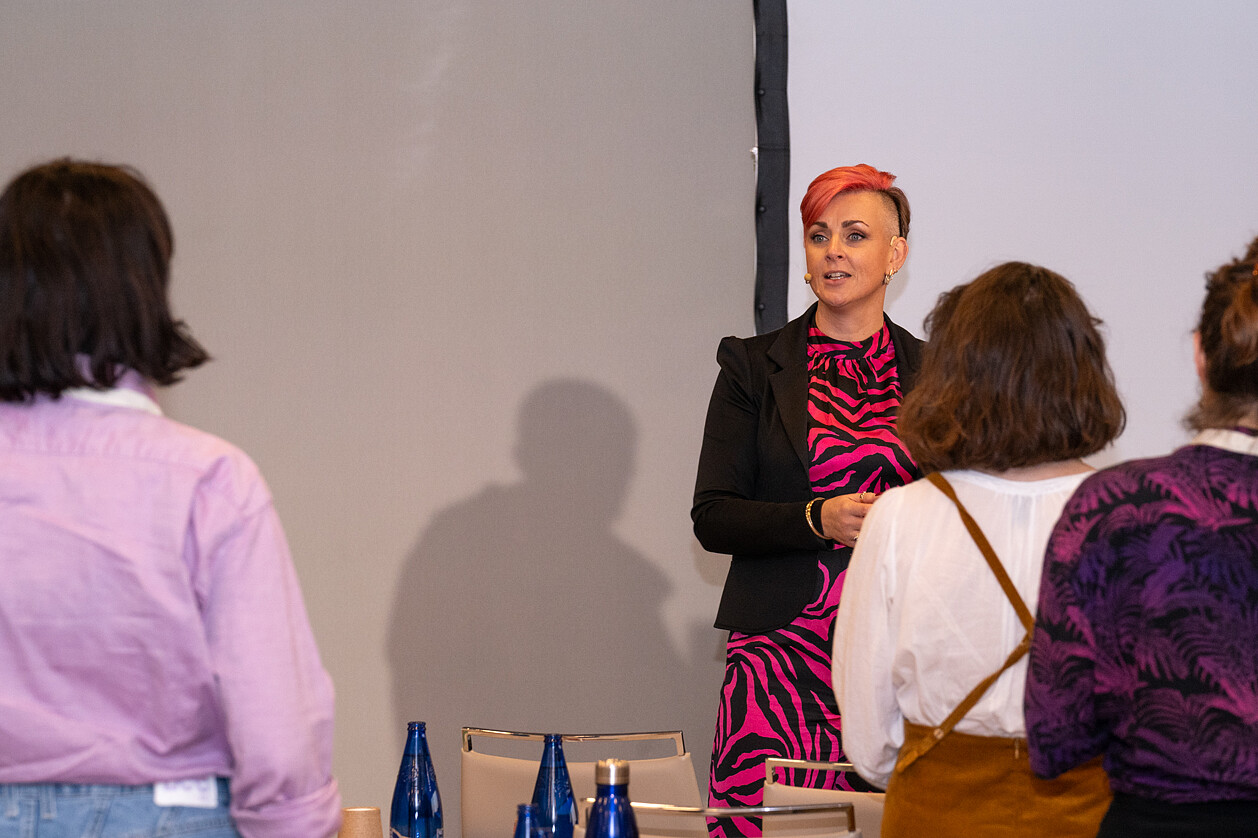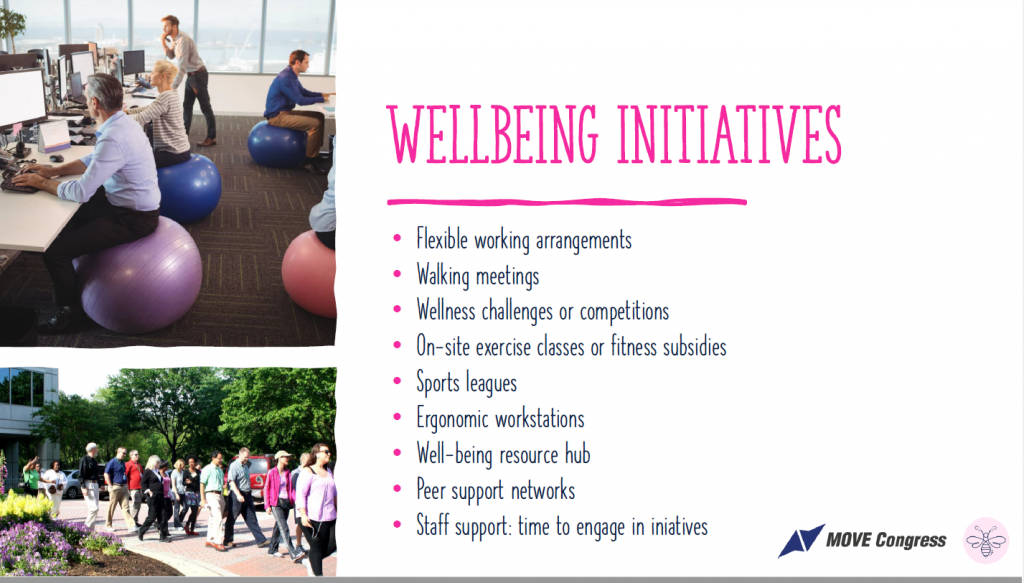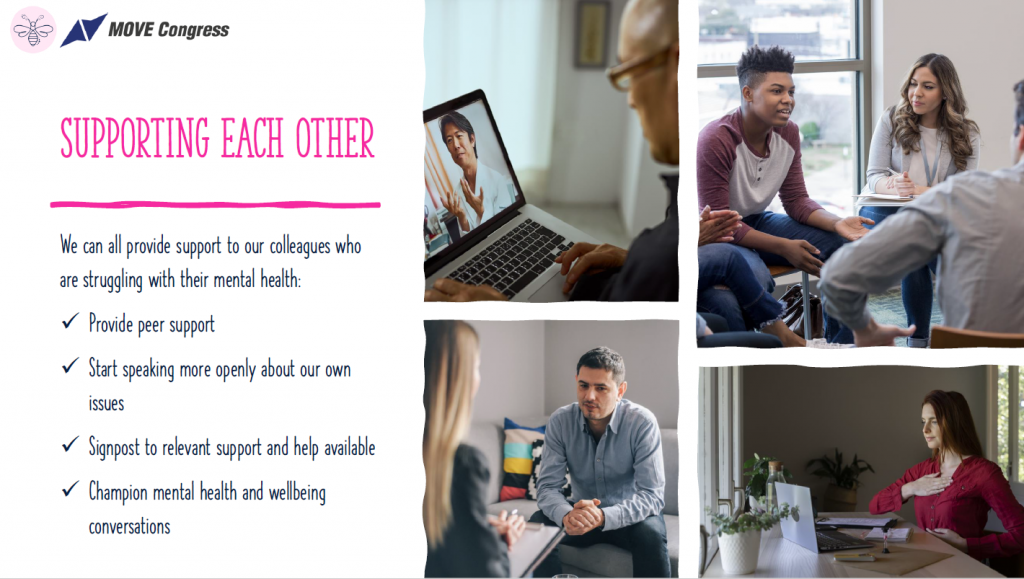
‘What happened?’ ‘Has this happened to you before?’ ‘What did you do last time?’ ‘What worked?’ ‘Is there something I can do to help you?’
“Wouldn’t it be amazing if we asked the same questions about mental health?” Barbara ponders. “‘I don’t understand what’s going on for you. Tell me about it.’”
Barbara Brennan raises awareness about mental health in her native Ireland and internationally, having worked for the NGO See Change and now independently as a public speaker and workshop facilitator, specialising in workplace wellbeing. Using analogies like the IT consultant, she encourages people to have better quality conversations to reduce fear and stigma surrounding mental health.
Like MOVE Congress keynote speaker Dominique de Marné, Barbara commands the stage in a warm and impactful manner as a Change Maker, Stigma Disruptor and Mental Health Advocate who draws on her own lived experience of surviving suicide attempts and battling severe mental illness for 15 years.
“When I was 15 to almost 30, I did not expect to be a national leader on mental health in my country,” she notes. “And I certainly did not expect to speak internationally and be considered an expert in my area. I didn’t go to school. I didn’t go to college. And yet, I am one of the voices that is helping to change my country around mental illness.”
Disrupt stigma by breaking the silence
Having experienced stigma in the workplace on her road to recovery, Barbara discovered that stigma stems from unconscious bias and assumes that the person has a reduced capacity and will not get better, which can have an unfairly detrimental impact on their careers. Stigma is also fuelled by a misunderstanding of “mental health” in our communities.
“[Mental health is] not an absence of disorders,” she says. “When we say the words mental health, people assume it’s mental illness. We’re starting to understand the spectrum, that mental health is good health, it’s bad health and every step in between.”
She believes that stigma is also a manifestation of fear about how to approach someone who is struggling with their mental health. That’s why she urges colleagues and friends of sufferers to break the silence (“silence is powerful”) and take a practical approach, reminding them that they do not need to provide solutions and that listening is as important as asking the right questions.
“Most often when somebody talks to us, they don’t want an answer from us. They don’t want guidance. They don’t want us to fix them, because they’re not broken anyway. They want you to listen. That’s why we have two of those [ears] and one of those [mouth], because we should listen twice as much as we speak.”

Movement is linked to mental health
Among the proactive initiatives workplaces can take to nurture workers’ mental health and provide support to those who are struggling (see the slide above), Barbara points to resource hubs and sharing knowledge as highly effective tools.
“The wellbeing resource hub – this for me is a phenomenal thing and it’s something that the MOVE Congress has done. It’s given space for us to speak to each other. What do you know? What can you share? This isn’t about creating [a resource] and giving it to the people, it’s about saying ‘here’s what we found, is there anything that you would like to add?’”
In Ireland, for example, there is a growing awareness that occupational health and safety is about more than securing wires on the floor and removing physical hazards from office spaces. Psychological safety and psychosocial safety are gaining more attention, as well as the benefits of exercise and changing postures regularly behind the desk.
Physical discomfort leads to mental strain and deteriorating behaviour, Barbara notes, so it’s important to understand how important movement is for our mental health.
“If you move your body, you’re going to feel better. If you feel better, you’re going to want to move your body better. If you feel better and move your body better, you’re going to want to be with other people who are moving their bodies and feeling better. Now we’ve got a community.”
Here we feature a few slides from the full presentation that is available for MOVE Congress participants via the event app. As part of a growing community of advocates and practitioners, she also invites people to connect with her through her website and LinkedIn, and offers to keep the networking going by referring them to other experts from the field.
“The thing about mental health is that we don’t really engage with it too much until it becomes a problem,” she points out. Now there are plenty of reasons to take a proactive approach as both an individual and an office ally – so why not start now?
Find out more about Barbara and her work as a Change Maker, Stigma Disruptor and Mental Health Advocate https://www.barbarabrennan.ie/

Vesterbrogade 6D
1620 Copenhagen V
Denmark
Copyright © 2024 International Sport and Culture Association. All rights reserved.
GDPR | Site Map
Vesterbrogade 6D
1620 Copenhagen V
Denmark